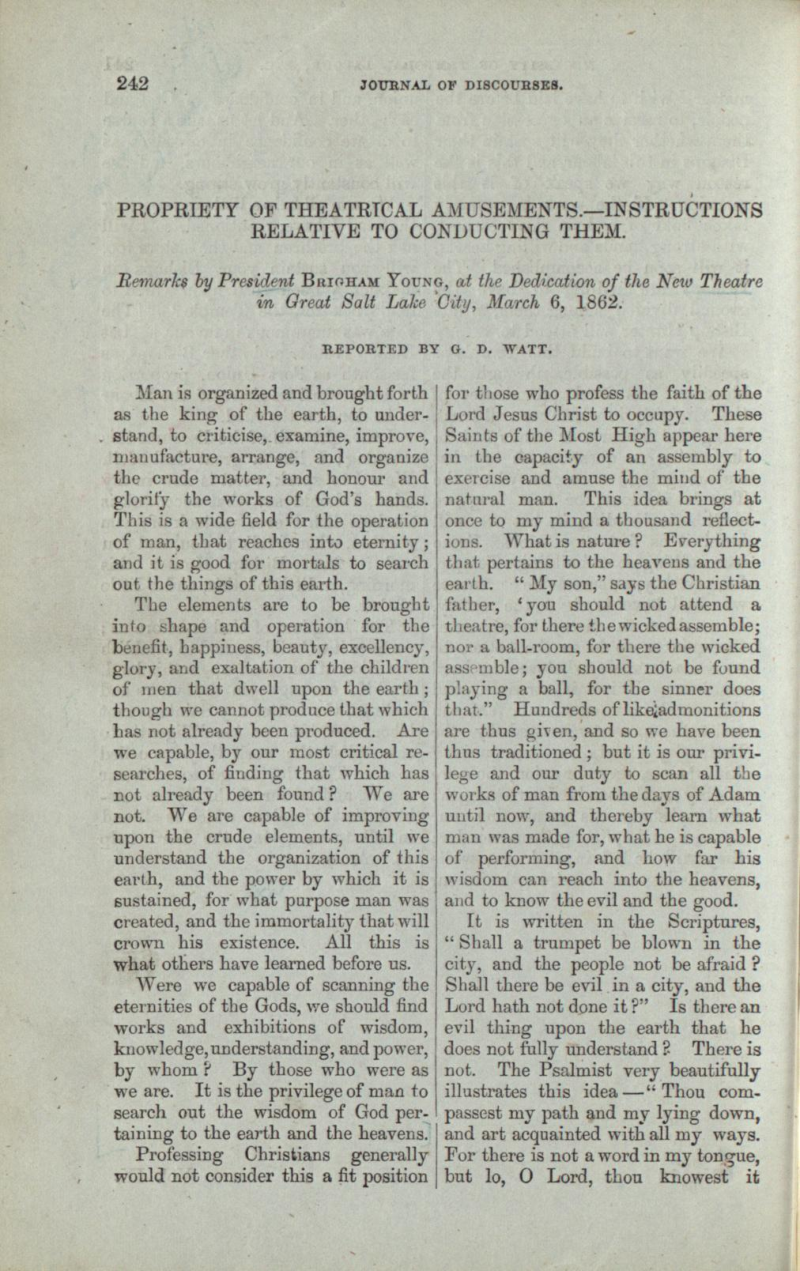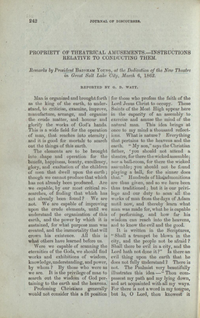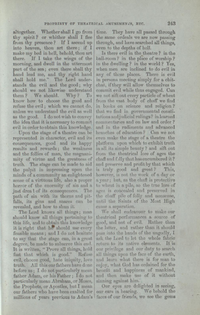Brigham Young teaches that Adam had a God and Father of his own.
- Type
- Speech / Court Transcript
- Hearsay
- Scribed Verbatim
- Reference
Brigham Young, "Propriety of Theatrical Amusements—Instructions Relative to Conducting Them," Journal of Discourses, 26 vols. (Liverpool: George Q. Cannon, 1862), 9:242-43
- Scribe/Publisher
- George D. Watt
- Audience
- Reading Public, Members of The Church of Jesus Christ of Latter-day Saints
- Transcription
Man is organized and brought forth as the king of the earth, to understand, to criticise, examine, improve, manufacture, arrange, and organize the crude matter, and honour and glorify the works of God's hands. This is a wide field for the operation of man, that reaches into eternity; and it is good for mortals to search out the things of this earth.
The elements are to be brought into shape and operation for the benefit, happiness, beauty, excellency, glory, and exaltation of the children of men that dwell upon the earth; though we cannot produce that which has not already been produced. Are we capable, by our most critical researches, of finding that which has not already been found? We are not. We are capable of improving upon the crude elements, until we understand the organization of this earth, and the power by which it is sustained, for what purpose man was created, and the immortality that will crown his existence. All this is what others have learned before us.
Were we capable of scanning the eternities of the Gods, we should find works and exhibitions of wisdom, knowledge, understanding, and power, by whom? By those who were as we are. It is the privilege of man to search out the wisdom of God pertaining to the earth and the heavens.
Professing Christians generally would not consider this a fit position for those who profess the faith of the Lord Jesus Christ to occupy. These Saints of the Most High appear here in the capacity of an assembly to exercise and amuse the mind of the natural man. This idea brings at once to my mind a thousand reflections. What is nature? Everything that pertains to the heavens and the earth. "My son," says the Christian father, 'you should not attend a theatre, for there the wicked assemble; nor a ball-room, for there the wicked assemble; you should not be found playing a ball, for the sinner does that." Hundreds of like admonitions are thus given, and so we have been thus traditioned; but it is our privilege and our duty to scan all the works of man from the days of Adam until now, and thereby learn what man was made for, what he is capable of performing, and how far his wisdom can reach into the heavens, and to know the evil and the good.
It is written in the Scriptures, "Shall a trumpet be blown in the city, and the people not be afraid? Shall there be evil in a city, and the Lord hath not done it?" Is there an evil thing upon the earth that he does not fully understand? There is not. The Psalmist very beautifully illustrates this idea—"Thou compassest my path and my lying down, and art acquainted with all my ways. For there is not a word in my tongue, but lo, O Lord, thou knowest it altogether. Whether shall I go from thy spirit? or whither shall I flee from thy presence? If I ascend up into heaven, thou art there; if I make my bed in hell, beheld, thou art there. If I take the wings of the morning, and dwell in the uttermost part of the sea; even there shall thy hand lead me, and thy right hand shall hold me." The Lord understands the evil and the good; why should we not likewise understand them? We should. Why? To know how to choose the good and refuse the evil; which we cannot do, unless we understand the evil as well as the good. I do not wish to convey the idea that it is necessary to commit evil in order to obtain this knowledge.
Upon the stage of a theatre can be represented in character, evil and its consequences, good and its happy results and rewards; the weakness and the follies of man, the magnanimity of virtue and the greatness of truth. The stage can be made to aid the pulpit in impressing upon the minds of a community an enlightened sense of a virtuous life, also a proper horror of the enormity of sin and a just dread of its consequences. The path of sin with its thorns and pitfalls, its gins and snares can be revealed, and how to shun it.
The Lord knows all things; man should know all things pertaining to this life, and to obtain this knowledge it is right that he should use every feasible means; and I do not hestitate to say that the stage can, in a great degree, be made to subserve this end. It is written, "Prove all things, hold fast that which is good." Refuse evil, choose good, hate iniquity, love truth. All this our fathers have done before us; I do not particularly mean father Adam, or his Father; I do not particularly mean Abraham, or Moses, the Prophets, or Apostles, but I mean our fathers who have been exalted for millions of years previous to Adam's time. They have all passed through the same ordeals we are now passing through, and have searched all things, even to the depths of hell.
Is there evil in the theatre? in the ball-room? in the place of worship? in the dwelling? in the world? Yes, when men are inclined to do evil in any of these places.
- Citations in Mormonr Qnas
The B. H. Roberts Foundation is not owned by, operated by, or affiliated with the Church of Jesus Christ of Latter-day Saints.



